裕兴新概念英语第二册笔记-第19课
- 格式:doc
- 大小:25.00 KB
- 文档页数:4
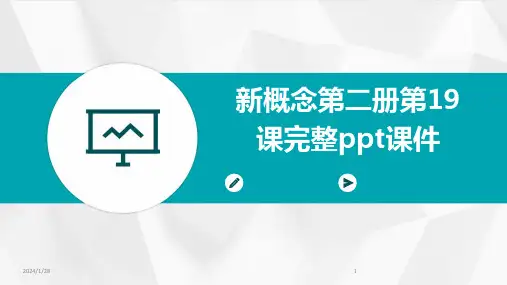
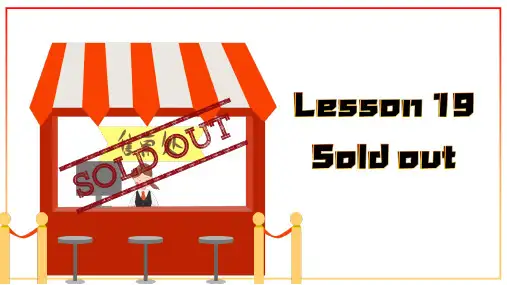
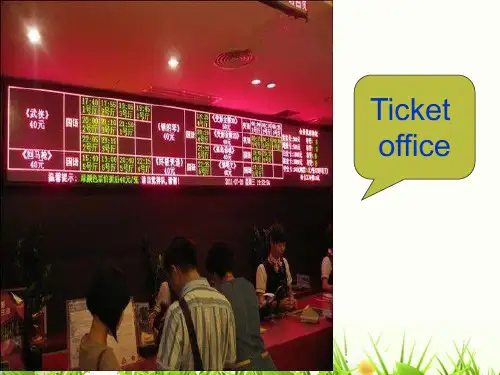
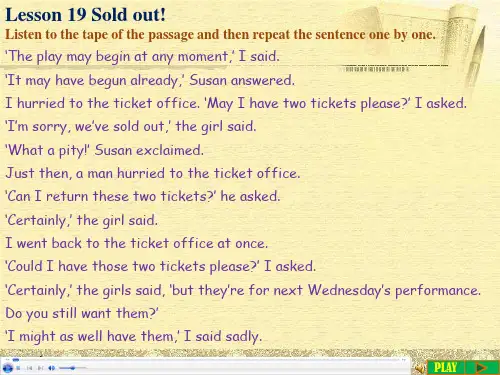

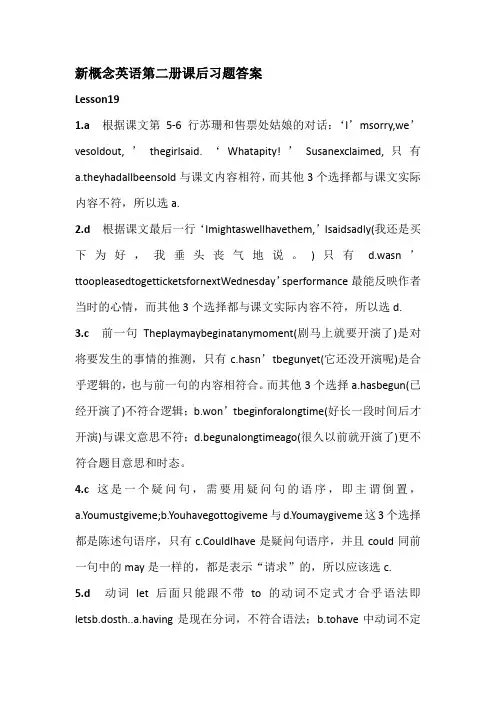
新概念英语第二册课后习题答案Lesson191.a 根据课文第5-6行苏珊和售票处姑娘的对话:‘I’msorry,we’vesoldout,’thegirlsaid.‘Whatapity!’Susanexclaimed,只有a.theyhadallbeensold与课文内容相符,而其他3个选择都与课文实际内容不符,所以选a.2.d根据课文最后一行‘Imightaswellhavethem,’Isaidsadly(我还是买下为好,我垂头丧气地说。
)只有 d.wasn’ttoopleasedtogetticketsfornextWednesday’sperformance最能反映作者当时的心情,而其他3个选择都与课文实际内容不符,所以选d.3.c前一句Theplaymaybeginatanymoment(剧马上就要开演了)是对将要发生的事情的推测,只有c.hasn’tbegunyet(它还没开演呢)是合乎逻辑的,也与前一句的内容相符合。
而其他3个选择a.hasbegun(已经开演了)不符合逻辑;b.won’tbeginforalongtime(好长一段时间后才开演)与课文意思不符;d.begunalongtimeago(很久以前就开演了)更不符合题目意思和时态。
4.c 这是一个疑问句,需要用疑问句的语序,即主谓倒置,a.Youmustgiveme;b.Youhavegottogiveme与d.Youmaygiveme这3个选择都是陈述句语序,只有c.CouldIhave是疑问句语序,并且could同前一句中的may是一样的,都是表示“请求”的,所以应该选c.5.d 动词let后面只能跟不带to的动词不定式才合乎语法即letsb.dosth..a.having是现在分词,不符合语法;b.tohave中动词不定式不应该带to,也不合乎语法;c.had是动词的过去式,也不符合语法;只有d.have是不带to的动词不定式,因此应该选d.6.b 这个句子的时间状语nextWednesday下星期三,班是表示将来的时间,所以需要用将来时态。

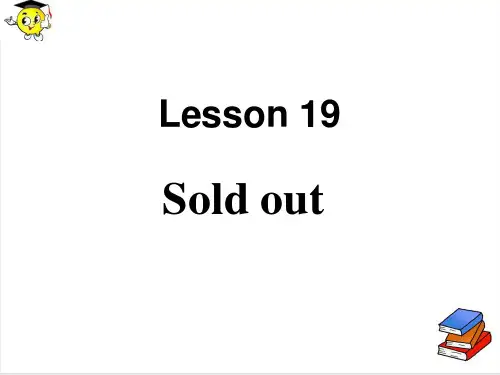

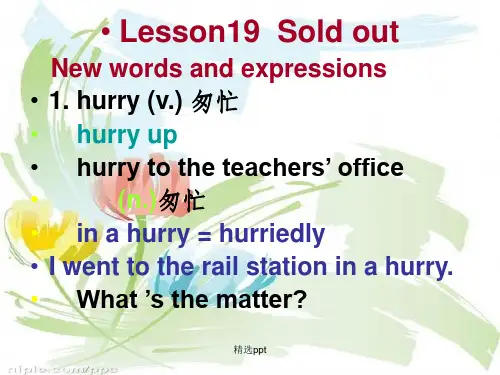
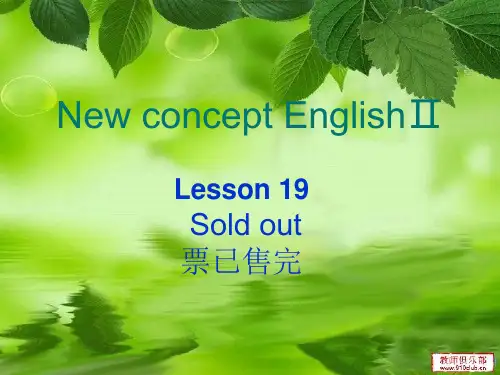
1 / 4 单词学习 hurry n./ v. 匆忙,急忙 作名词---------in a hurry (in such a hurry): quickly, hastily, hurriedly 匆忙地,迅速地 eg. We went to the station in a hurry. 我们匆忙赶到车站。 作动词---------hurried----------hurried 匆忙,迅速或仓促地做某事 eg. Don’t hurry, there is plenty of time. 不要着急,我们有大量时间。 eg. I hurried to the ticket office. 我匆忙地赶到售票处。 eg. I hurried to school. 我匆忙地赶到学校。 eg. We are late, I must hurry you. 我们已经迟到,我必须催促你。 hurry up! 快点(口)--------- be quick eg. Hurry up! The bus is coming. 快点!公交车就要来了。 eg. Hurry up! Supper is ready. 快点!晚饭已经准备好了。 hurried adj. 匆忙的,仓促完成的 a hurried meal 匆匆忙忙的一顿饭 a hurried wedding 仓促的婚礼 hurriedly adv. --------- in a hurry ticket office--------- booking office 火车站的、戏院等地方的售票处 box office 戏院、剧院的售票处(专指) a box office success 卖座的,买得好的 box n. 1) 盒子,箱子 2) 分隔的或围成的区域(戏院的包厢) 3) 小亭子,岗亭 the telephone box 电话亭 4) the box 电视(俚) boxer 拳击手 boxing 拳击运动 Boxing day 圣诞馈赠日 在英国,圣诞节的次日,若是星期日,则顺延一日,惯例在此时赠送雇员,邮差等礼物。 pity ['piti] n. 1) 同情。怜悯 [U] be full of pity for sb / be filled with pity for sb 多某人充满同情,十分同情某人 feel pity for sb 对…同情 eg. He felt pity for the jobless man. 他对这个没有工作的人表示同情。 cry from pity 同情的泪水 2) 遗憾的事 [C] eg. What a pity that we can’t get the tickets for the performance of the Green Wood boys. 多遗憾啊!我们没能得到绿林少年演出的票。 eg. What a pity! / What a shame! 多遗憾啊! eg. It is a pity. 这是一个遗憾。 eg. It is a thousand pities. 非常遗憾。 exclaim [iks'kleim] v. cry out suddenly and loudly from pain, anger, surprise, etc. 因疼痛、愤怒、惊奇等尖叫、呼喊 eg. “What?”, he exclaimed, “Are you leaving without me?”. “什么?”他大声说,“你要把我丢下吗?” eg. “What a pity”, She exclaimed. 她大声说:“多遗憾呵”。 exlaim in astonishment 惊叫 2 / 4
exlaim in delight 高兴地大叫 shout 呼喊,大声说话,吼叫 shout out 吼出声来 eg. Don’t shout at me. I can hear you all right. 别大声对我喊,我能听清你的话 shout for joy / shout with joy 大声欢呼 shout oneself hoarse [hɔ:s] 把嗓子喊哑 scream 发出尖叫,惨叫。惊叫 eg. She screamed in a fright. 她恐怖地大声尖叫。 return v. 归还,退还,返回 sadly adv. 悲哀地,丧气地 sad adj. 悲哀的,忧愁的,难过的 (---dder, ---ddest ) a sad look 一个悲哀的表情 a sad story 一个悲惨的故事 a sad event 一件悲哀的事情 eg. John is sad because his dog has been dead. 约翰很悲伤,因为他的狗死了。 eg. I am very sad to hear the news. 获悉这个消息,我很悲痛。 sadly adv. 悲哀地,丧气地 sadly-----in a sad manner eg. She looked at him sadly, and said sadly, “I am leaving you”. 她难过地看着他,然后忧伤地说:“我要走了”。 sadness n. 悲哀,悲伤 [U]
课文讲解 at any moment…..at any time 随时 at this moment…..now 此时此刻 at that moment…..then 那时 may begin 一种可能性的判断 must + 原形:指比较肯定的判断 eg. You must be Tina. I’ve seen your picture. 你一定是蒂娜,我见过你的照片。 cannot + 原形:指否定性的判断 eg. You can’t be Tina. She has been abroad. 你不可能是蒂娜,她已经出国了。 may + 原形:指可能性的判断 eg. She may be Tina, but I’m not sure. 她可能是蒂娜,但我确定不了。 may have done 对发生完的事情一种可能性判断 must have done 对发生完的事情一种肯定性判断 can’t have done 对发生的事情一种否定性判断 eg. I can’t find my bag. It must have been stolen. 我找不到包,一定是被偷了。 eg. Jane walked past me without speaking. She can’t have seen me. 简从我身旁走过没说话,她一定是没有看见我。 eg. The bag may have been stolen. 书包可能是被偷了。 May I have two tickets please? = May I buy two tickets please? sell…..sold…..sold ←→ buy……bought……bought 1) sell out 售完 sell out of sth 卖光 eg. We’ve sold out of all the ticksts. / All the tickets have been sold out. eg. The play has sold out. / There are no tickets left. 这部戏的票都已卖完了. 3 / 4
2) be sold out of sth 卖光存货、票等 be sold out 售光 eg. We are sold out of Sunday newspaper, Sir. 先生,星期天的报纸已经卖完了。 3) sell well 畅销 sell badly 滞销 eg. The tickets for the play sold well. 这部戏的票卖座。 eg. The tickets for the play sold badly. 这部戏的票不卖座。 4) sell for + 价格 以…价格出售 sell at + 价格 以…价格卖出 eg. The antique vase will sell for 5000 dollars at least. 这件古花瓶至少要卖5000美元。 eg. Cabbage is selling at a high price this year. 今年洋白菜的价格很高。 5) seller 售货人 ←→ buyer 买方 a good seller 畅销的商品 a bad seller 滞销的商品 a best seller 畅销品 6) sale n. for sale 待售 a house for sale 待售的房子 not for sale 非卖品 on sale 出售,上市;廉价,特价 (Am.) eg. They sell eggs on sale that day. 那天鸡蛋特价销售。 salesman 男外卖员,(男)推销员 an insurance salesman 保险推销员 saleswoman 女店员,(美)女推销员 I’m sorry. / I am sorry. We’ve sold out. / We have sold out. eg. When’ll I see you? / When will I see you? eg. I’ll not stay a moment longer. / I shall not stay a moment longer. just then / just at the moment next Wednesday’s performance today’s newspaper may as well may as well / might as well + do: 意思是“还是…好,不妨”,较勉强,不是非常乐意,不得不选一个。 eg. Do you think you’ll pass the exam? 你认为你会通过考试吗? I’ll never pass. I might as well give up. 决不会,我还是放弃的好。 eg. Do you want to come to the cinema with me? 你想和我一起去看电影吗? I haven’t got anything to do, so I may as well come with you. 我反正没事可做,还是同你一起去吧。 Special Difficulties 1. There are not many people here. There aren’t many people here. 2. She did not tell me she had not seen you. She didn’t tell me she hadn’t seen you. 3.I shall not stay a moment longer. I shan’t stay a moment longer. 4. He’s in the living room. He’s just come home.